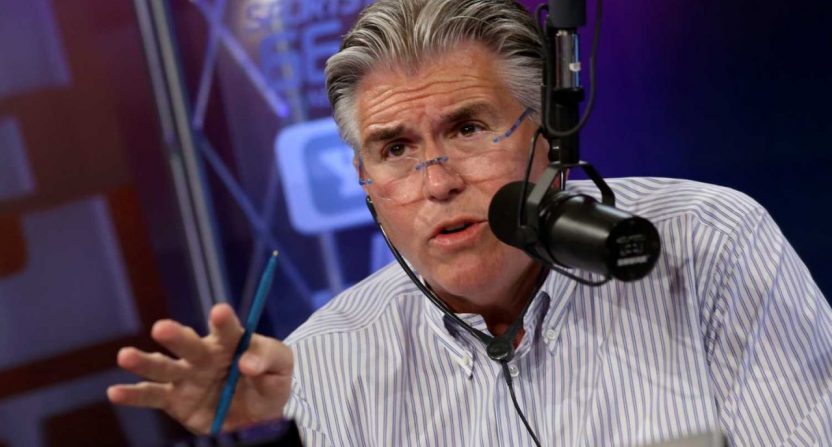WFAN host Mike Francesa apparently didn’t get the memo that “Oriental” isn’t an acceptable term in 2017. That’s a pretty wide consensus, as even Congressional Republicans and Democrats have agreed on it, passing bipartisan legislation in 2016 to strike the terms “Oriental” and “Negro” from federal law. Many find those terms offensive, racially charged and outdated, but Francesa doesn’t seem to. He dropped one “Oriental” and two “Oriental-Americans” in a minute-and-a-half discussion of The Slants’ Supreme Court trademark case (and its implications for pro sports teams with Native American names) with a caller Monday.
Update: Sports Funhouse has now put out a version which includes both Francesa’s initial comments, and then further comments from him once his producer told him not to use “Oriental.” Here’s the combined clip: highlights of his further comments (starting at 1:15) include him blaming it on a story he saw on TV using “Oriental,” him saying “You’re telling me that is a SLIGHT if you call someone Oriental-American?”, him saying “It doesn’t make any sense to me that it would be [derogatory], but if they want me to say Asian-Americans, more power to them. I’ll say whatever makes people happy,” him saying “I don’t want to make a big issue of this” (as he’s in his fourth minute of talking about it) and him quoting an apparent article in defense of the word (“Oriental, not ever, ever” (offensive). “And why would it be? All it literally means is ‘Of the Orient.”). Our transcription of the original comments follows the clip.
https://twitter.com/SportsFunhouse/status/876948422384771072
The caller says “So the Supreme Court just ruled that potentially offensive names could be trademarked.” Francesa cuts him off and says “Correct. It has to do with a case in Portland, a musical group named Slant, they won the case. So, they are an Oriental group that wanted to have the name Slant, and they could not get it trademarked. And the Supreme Court ruled that it’s freedom of speech, even if it’s offensive to some, it’s still freedom of speech and it should be protected. So they were allowed to trademark the name Slant, that’s what the ruling was.”
The caller then asked “What about Redskins, or Braves?” Francesa replied “Well, the feeling is that it’s going to be the same answer to the same question. The only other debate is that they were talking about themselves. They all were Oriental-Americans who were part of the group, rock band. I don’t know if they were a rock band, they were some kind of musical band from Oregon. And they could not trademark the name “Slant” even though they were a group of young, uh, Oriental-Americans. And that was the case that went to the Supreme Court. And they feel that it has bearing on the Redskins.”
Francesa is 63, so he undoubtedly grew up in a time where “Oriental” was more widely used, but that doesn’t make it acceptable. It’s especially worth noting that the pushback against it isn’t exactly new. “Asian” or “Asian-American” started to be used in government documents instead of “Oriental” decades ago thanks to pushback. Washington State banned “Oriental” in government documents in 2002, and New York State followed suit in 2009.
And many have long made good cases about why the term should be gone. New York representative Grace Meng said “The term ‘Oriental’ has no place in federal law and at long last this insulting and outdated term will be gone for good” when her bill to remove it from federal law was signed into law in 2016. In 2009, around the New York law, San Francisco Chronicle columnist Jeff Yang told NPR why he found the term problematic:
“When you think about it, the term Oriental itself kind of feels freighted with luggage. You know, it’s a term which you can’t think of without having that sort of the smell of incense and the sound of a gong kind of in your head.”
“And you know, beyond that it’s – that’s just sort of like the cultural baggage that comes with it. I mean obviously there are political issues. It’s something which has been associated with racist campaigns, with stereotypical imagery. And you know, frankly, it’s just not a very precise term.”
“…Beyond that it’s – that’s just sort of like the cultural baggage that comes with it. I mean obviously there are political issues. It’s something which has been associated with racist campaigns, with stereotypical imagery. And you know, frankly, it’s just not a very precise term.”
And Howard University law professor Frank H. Wu told the New York Times in 2009 that the term was troubling given the associated connotations:
“It’s associated with a time period when Asians had a subordinate status,” Professor Wu said. He said that the term was associated with exoticism and with old stereotypes of geisha girls and emasculated men. “‘Oriental’ is like the word ‘negro.’ It conjures up an era.”
So yeah, that’s something you probably shouldn’t say on the radio, and Francesa should know better. It will be interesting to see if he apologizes, and if so, how he apologizes.
There have been plenty of problematic comments made about people of Asian descent in sports over the years, like Steve Kerr’s “Chinaman” comment about Yao Ming in 2004 or Jason Whitlock’s racist jokes about Jeremy Lin, but a big difference in if they’re long-remembered is how the apology was handled. Kerr apologized thoroughly and sincerely, and many seemed to accept that. Whitlock’s apology seemed much less thorough, and included blame at his mother and Richard Pryor, plus annoyance that people didn’t like his joke. If Francesa’s going to apologize here, the Kerr model would seem like a better one to follow.
[Sports Funhouse on Twitter]






